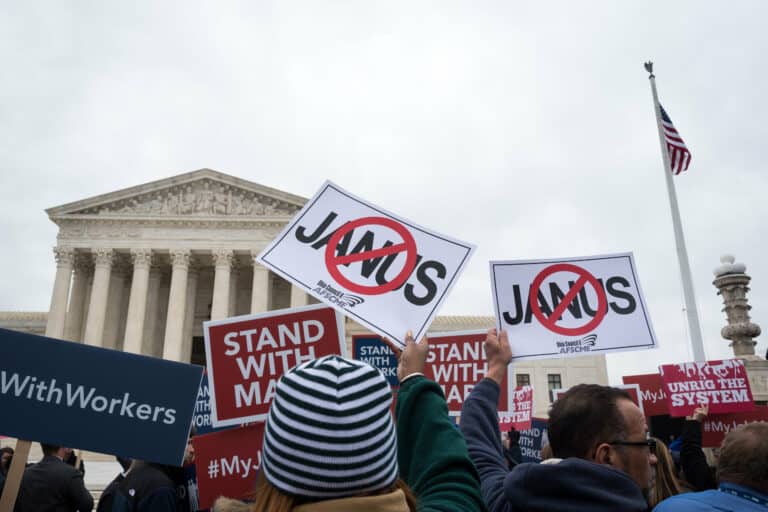
Sharon Block is a Professor of Practice and the Executive Director of the Center for Labor and a Just Economy at Harvard Law School.
If you can define success as preventing something bad from happening, the labor movement notched a victory Saturday morning for public sector collective bargaining rights. D.C. District Court Judge Ketanji Brown Jackson issued a strongly worded opinion, invalidating the Trump administration’s executive orders that sought to rewrite the rules for federal sector collective bargaining. When the Bush Administration similarly tried to gut collective bargaining rights for thousands of federal employees, Judge Brett Kavanaugh wrote the opinion (AFGE v. Gates) giving that effort the okay. Thus, the Kavanaugh nomination raises the likelihood that this victory against the Trump Administration may be ultimately doomed.
Trump Executive Orders
In May, the Trump Administration issued three executive orders that sought to constrain the scope of federal sector collective bargaining. Most significantly, the executive orders: (1) limited “official time;” that is, the amount of time that a federal employee can be paid to attend to union business, including representing coworkers in grievance and arbitration proceedings and negotiating collective bargaining agreements, to no more than 25 percent of any employee’s time; (2) dictated that federal agencies take positions in negotiations that effectively removed important workplace policies from the collective bargaining process; and (3) shortened the time period from 120 to 30 days available to federal employees to contest accusations of poor performance that could form the basis for dismissal. The executive orders justified these policies as necessary to increase the efficiency and effectiveness of the federal workforce.
In a rebuke to the Trump Administration’s policy, Judge Jackson invalidated the heart of the executive orders. Her decision is founded on a series of key findings: (1) that the cumulative effect of the orders would be to “eviscerate” the right to collective bargaining for federal employees; (2) that federal sector labor statutes are premised on Congress’s judgment that collective bargaining in the federal sector is in the public interest; (3) that the Trump executive orders are premised on a contrary conclusion; namely, that collective bargaining is an impediment to the efficient and effective running of the government; and (4) that the President lacks the authority to implement policies that so directly subvert the intent of Congress.
The decision was characterized in the media as a big win for labor. Labor leaders hailed the Jackson decision. AFL-CIO President Rich Trumka called the decision a “tremendous victory” and signaled that the labor movement is “fighting back and winning.”
What Would Kavanaugh Do
Unfortunately, labor’s victory may be short-lived. Although the Trump Administration has not yet said whether it will appeal Judge Jackson’s decision, recent events suggest that it will. District courts have struck several of the Administration’s executive orders and the Administration has consistently appealed those defeats: DACA; Muslim ban, sanctuary cities ban, and transgender military service ban. The Trump Justice Department already has taken its defense of the Muslim ban executive order all the way to a Supreme Court victory. Several of these other cases may be on the way there too.
What is likely to happen to the federal sector labor executive orders on appeal? If Judge Kavanaugh is confirmed to the Supreme Court, his record suggests that they ultimately will be revived. As I noted in an earlier OnLabor post, Kavanaugh expressed hostility to federal sector collective bargaining rights while serving on the D.C. Circuit. During the Bush Administration, Kavanaugh sat on a panel that reviewed a similar effort to undermine federal employees’ collective bargaining rights. He wrote the opinion in AFGE v. Gates that allowed the Bush Administration to implement regulations effectively curtailing union representation for thousands of Department of Defense civil servants.
What is particularly telling about Kavanaugh’s opinion in AFGE v. Gates is not just that he sided with the President against federal workers, but the extreme position he took in doing so. The Bush Administration argued to the D.C Circuit that it was not trying to abolish collective bargaining for this group of federal employees. Instead, DoD argued that Congress gave it discretion to modify those rights and that it was simply exercising that flexibility, stopping short of destroying them. Kavanaugh, however, one-upped the Bush Administration. As the dissent points out, he found that the Secretary of Defense actually had the power to abolish collective bargaining altogether.
If Kavanaugh is willing to jettison collective bargaining rights for federal employees when the President doesn’t even ask for such sweeping power, it is hard not to be pessimistic about what he would do in a case where the President makes that request directly. As OnLabor has covered in several posts, the prospect of a Kavanaugh confirmation should raise serious concerns for American workers. For federal employees, this concern should be particularly acute. Saturday’s big win may be on a path to defeat if a Justice Kavanaugh is sitting on the Supreme Court at the path’s end.








Daily News & Commentary
Start your day with our roundup of the latest labor developments. See all
July 3
California compromises with unions on housing; 11th Circuit rules against transgender teacher; Harvard removes hundreds from grad student union.
July 2
Block, Nanda, and Nayak argue that the NLRA is under attack, harming democracy; the EEOC files a motion to dismiss a lawsuit brought by former EEOC Commissioner Jocelyn Samuels; and SEIU Local 1000 strikes an agreement with the State of California to delay the state's return-to-office executive order for state workers.
July 1
In today’s news and commentary, the Department of Labor proposes to roll back minimum wage and overtime protections for home care workers, a federal judge dismissed a lawsuit by public defenders over a union’s Gaza statements, and Philadelphia’s largest municipal union is on strike for first time in nearly 40 years. On Monday, the U.S. […]
June 30
Antidiscrimination scholars question McDonnell Douglas, George Washington University Hospital bargained in bad faith, and NY regulators defend LPA dispensary law.
June 29
In today’s news and commentary, Trump v. CASA restricts nationwide injunctions, a preliminary injunction continues to stop DOL from shutting down Job Corps, and the minimum wage is set to rise in multiple cities and states. On Friday, the Supreme Court held in Trump v. CASA that universal injunctions “likely exceed the equitable authority that […]
June 27
Labor's role in Zohran Mamdani's victory; DHS funding amendment aims to expand guest worker programs; COSELL submission deadline rapidly approaching